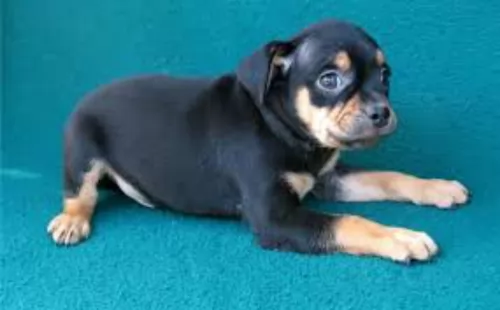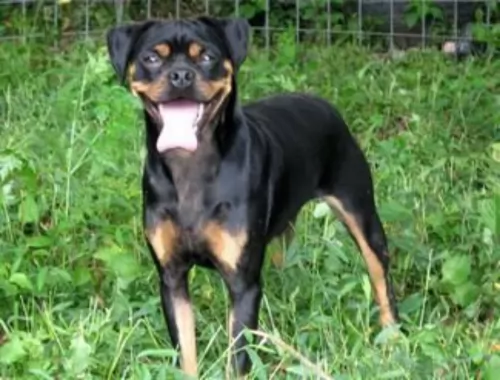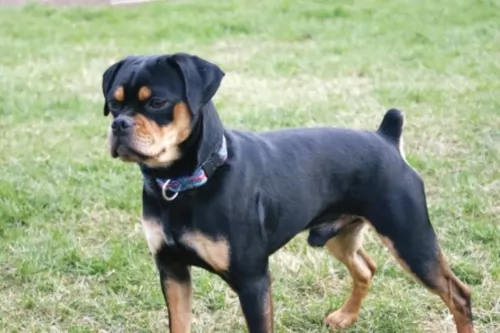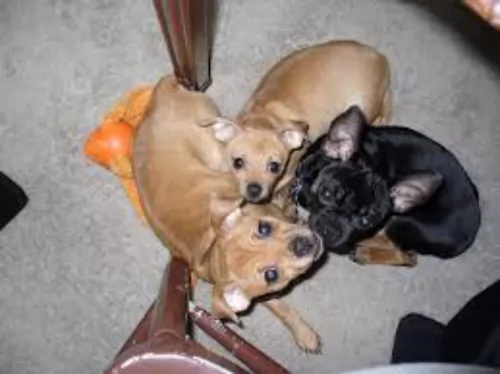 Petzlover
Petzlover Carlin Pinscher is originated from France but Norwegian Lundehund is originated from Norway. Carlin Pinscher may grow 7 cm / 2 inches shorter than Norwegian Lundehund. Both Carlin Pinscher and Norwegian Lundehund are having almost same weight. Both Carlin Pinscher and Norwegian Lundehund has almost same life span. Carlin Pinscher may have more litter size than Norwegian Lundehund. Carlin Pinscher requires Low Maintenance. But Norwegian Lundehund requires Moderate Maintenance
Carlin Pinscher is originated from France but Norwegian Lundehund is originated from Norway. Carlin Pinscher may grow 7 cm / 2 inches shorter than Norwegian Lundehund. Both Carlin Pinscher and Norwegian Lundehund are having almost same weight. Both Carlin Pinscher and Norwegian Lundehund has almost same life span. Carlin Pinscher may have more litter size than Norwegian Lundehund. Carlin Pinscher requires Low Maintenance. But Norwegian Lundehund requires Moderate Maintenance
 There are conflicting views as to where the Carlin Pinscher hails from, with some reports saying France and others the USA. The names of some breeders suggest it could be France.
There are conflicting views as to where the Carlin Pinscher hails from, with some reports saying France and others the USA. The names of some breeders suggest it could be France.
The dog hasn’t got a long history, being developed only in the early 1900s. Two breeders, Morgan and Buenafe left their Miniature Pinscher with a Pug owner for a while and on return discovered that the dogs had mated, producing puppies which looked like miniature Rottweilers.
It was in 1998 that a breeding program began and a Boxer was also brought into the mix to improve the characteristics of the dog. The dog is still being developed and isn’t recognized by the major kennel clubs.
 The Norwegian Lundehund hails from the island of Vaeroy, Norway and was created for the purpose of puffin hunting.
The Norwegian Lundehund hails from the island of Vaeroy, Norway and was created for the purpose of puffin hunting.
Now that these puffins are a protected species, the dog is no longer used for hunting and has become a companion dog.
The breed decreased in numbers during- and after World War II because the islands where he came from had an outbreak of distemper. It was in 1963 that another outbreak occurred and the dogs were almost wiped out. A breeding program saw their numbers being built up.
It was in 2011 that the dog was recognized by the American Kennel Club.
 The Carlin Pinscher has been developed to be a social and loving companion. Started as a cross between a Miniature Pinscher and Pug, other breeds have also been brought in. He still has varied appearances, often looking like a tiny Rottweiler but also looking like anything between the Miniature Pinscher or the Pug.
The Carlin Pinscher has been developed to be a social and loving companion. Started as a cross between a Miniature Pinscher and Pug, other breeds have also been brought in. He still has varied appearances, often looking like a tiny Rottweiler but also looking like anything between the Miniature Pinscher or the Pug.
This is a small sized dog standing at anything from 27- to 33 cm and weighing 5 or 6kg. The body is compact with sturdy legs coming from the Pug side. The skull is a dome shape, the ears can be erect or floppy and unless the tail is docked it can be long, curling somewhat over the back. The coat is short and smooth and comes in shades of tan, brown and black.
The Carlin Pinscher is small but with a strong personality, being gentle and sweet in nature. He promises to be a loyal and affectionate companion for his human family, loving to be involved in all their activities.
He is an energetic, playful little dog and also intelligent, so apart from a walk and ball games, he’ll need some toys for indoors too that can provide physical- and mental stimulation. With early training and socialization, the Carlin Pinscher is a good friend of children and he will get on well with other pets in the house too. He is a small dog so children should be supervised and taught to handle him with gentleness and kindness.
 As a spitz-type dog, with the Lundehund you’ll recognize the typical spitz-dog characteristics – the erect ears and the tail that curves over the back.
As a spitz-type dog, with the Lundehund you’ll recognize the typical spitz-dog characteristics – the erect ears and the tail that curves over the back.
He is a small to medium sized dog standing at 30 – 40cm and weighing 6 – 9kg. He is an active dog and is as agile as a fox.
He has a dense double coat which is white, reddish/tan with some black tips. He is a dog which sheds constantly.
Strangely this dog has 6 toes and his rear pads have elongated foot pads which have helped the dog be able to climb over rocks. He also has a flexible type of neck that is capable of craning back so that the head touches the spine. The dog has some unique features and wriggling in and out of small spaces is another of his characteristics. In fact he can do things that you would not imagine a dog could do.
When you have a Lundehund in your life you’ll agree he has a happy, amicable personality. He is non-aggressive.
He will require training and socialization as he is an independent dog who can be obstinate. He is quite aloof with strangers too and once he starts barking at them he tends to want to continue. Training him will put an end to that irritating behavior. He is a loving, loyal dog, enjoying the company of his human family.
 The Carlin Pinscher makes an ideal little pet and he will be content to live in a small home in the city or in the country, just so long as he is with an owner who loves and cares for him. They are balanced, easy-to-get-along-with dogs, being even-tempered, playful and outgoing.
The Carlin Pinscher makes an ideal little pet and he will be content to live in a small home in the city or in the country, just so long as he is with an owner who loves and cares for him. They are balanced, easy-to-get-along-with dogs, being even-tempered, playful and outgoing.
He is active, intelligent, strong-willed, stubborn and brave. It is true that people who have kept mixed-breed dogs rave about them. Certainly mixed breed dogs have earned themselves a reputation for being superb family pets. They’re healthy, feisty, quaint and entertaining.
These days many mixed breeds are no longer pavement specials but part of careful breeding, such as with the Carlin Pinscher. He is full of personality and makes a great family pet, getting along with other animals and also being good around children.
 The Norwegian Lundehund isn’t your everyday dog and in fact he is known as a primitive breed. Perhaps he wouldn’t be the best dog to have if you’re a first-time dog owners as training is quite difficult too.
The Norwegian Lundehund isn’t your everyday dog and in fact he is known as a primitive breed. Perhaps he wouldn’t be the best dog to have if you’re a first-time dog owners as training is quite difficult too.
People who are willing to take a chance on him say that with training and socialization he can become a loving canine companion.
 The Carlin Pinscher is a feisty little dog who can live to be up to 13, 14 or 15 years of age. He is a fairly healthy breed too, but there will always be some issues that the Carlin Pinscher might be prone to. Typical dog ailments include eye problems, hip dysplasia, liver problems, skin- and dental problems.
The Carlin Pinscher is a feisty little dog who can live to be up to 13, 14 or 15 years of age. He is a fairly healthy breed too, but there will always be some issues that the Carlin Pinscher might be prone to. Typical dog ailments include eye problems, hip dysplasia, liver problems, skin- and dental problems.
All liver problems with a dog are serious and will need veterinary intervention. A noticeable symptom of liver disease is jaundiced yellowing of the white of the eye. You might even see a yellowing on the underside of the ear flap. Your pet will have loss of appetite, constipation as well as highly colored urine.
 The Lundehund is prone to digestive disorders but even so he has got a good chance of living to be 11, 12, 13 or 14 years of age with good care.
The Lundehund is prone to digestive disorders but even so he has got a good chance of living to be 11, 12, 13 or 14 years of age with good care.
He is however, one of these dogs prone to health problems of which chronic intestinal disease is one. Its the kind of illness that can recur because it is resistant to treatment.
Experts on these dogs say that they should have a fecal test done every 6 months or so, saying that one thing a bit negative with this dog breed is that you may well be forking out quite a bit on chronic veterinary care.
 With his short, smooth coat, the Carlin Pinscher is a low to moderate shedder who is easy to maintain. The short coat will simply need a brush-down twice a week to rid him of loose hairs. If he is dusty, you can wipe the coat down with a warm, damp cloth.
With his short, smooth coat, the Carlin Pinscher is a low to moderate shedder who is easy to maintain. The short coat will simply need a brush-down twice a week to rid him of loose hairs. If he is dusty, you can wipe the coat down with a warm, damp cloth.
Every dog, large or small needs a balanced diet that consists of proteins, fats, vitamins, minerals and carbohydrates. A well balanced diet keeps a dog healthy but also in shape. A dog requires certain ingredients in its diet, depending on age, activity levels, size and stage of life such as pregnancy or illness.
For starters, dogs need fresh, cool water at all times. If you’re confused about dry kibble or semi-moist dog food for instance, speak to your vet about what your Carlin Pinscher needs. It’s always good to give your pet variety, so mixing in some rice, vegetables and meat will be wonderful for your pet as will some raw meat from time to time.
 Like any other dog, the Norwegian Lundehund will do well on the best quality food. If you buy him commercially manufactured food, check the ingredients on the packaging. Lots of these lower quality foods are made from ingredients that are toxic for your pet, so buy a good quality one.
Like any other dog, the Norwegian Lundehund will do well on the best quality food. If you buy him commercially manufactured food, check the ingredients on the packaging. Lots of these lower quality foods are made from ingredients that are toxic for your pet, so buy a good quality one.
Buy food according to your dog’s age and activity levels. To make his meals more interesting, add in some delicious home prepared food for him. Stay away from spicy, exotic foods and go for something like boiled chicken, brown rice and vegetables. Some raw meat added to the kibble from time to time can also do wonders for your pet as he requires a high-protein diet. Make sure he always has access to fresh, cool water.
Other ‘caring’ things to do to make sure your pet has a quality lifestyle is -
Brush his hair twice a week as he is a fairly heavy shedder. Not only does it keep the coat nice and shiny, it builds up a bond between you and your pet.
Check his ears and eyes regularly to make sure they are free from infection.
Clip his nails when they get long as your pet can hurt himself if the nails hook onto things.
Whenever he is ill, get him to the vet for a check-up.
Make sure he has a nice safe, dry, warm, snug place to sleep.
Keep him well exercised. A dog that is put into the backyard and more or less forgotten will be most miserable. Why get a pet if you don’t want to make him a 100% part of the family?